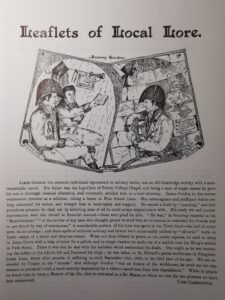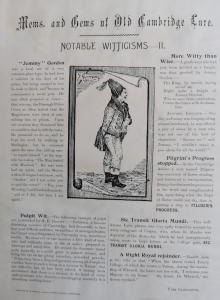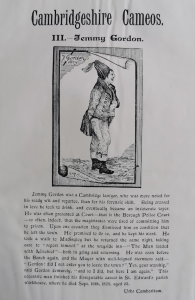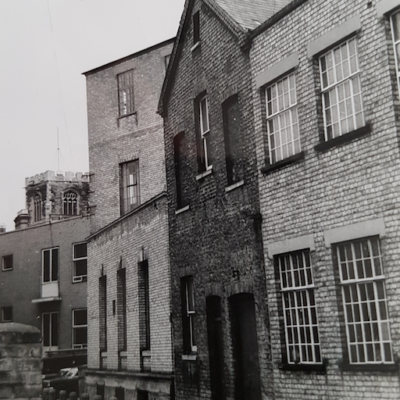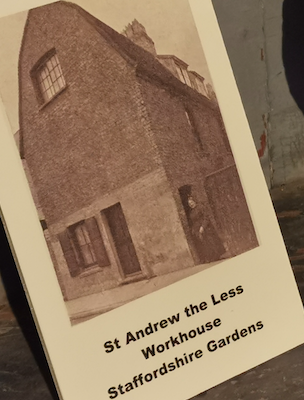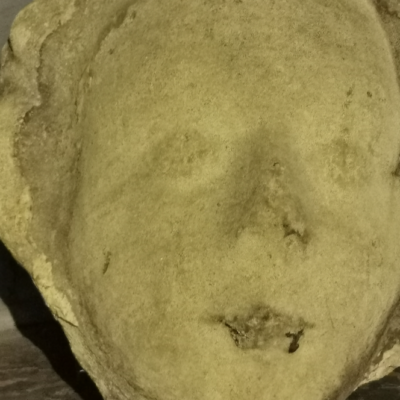Search by topic
- archaeology
- Building of Local Interest
- charity
- church
- crime
- dressmaker
- fire
- Great Eastern Railway
- Listed building
- Mapping Relief
- medieval
- oral history
- poverty
- Public House
- Rattee & Kett
- Religious House
- Roman
- scholar
- school
- Then and Now
- tudor
- women
- work
- world war one
- world war two
Search by text
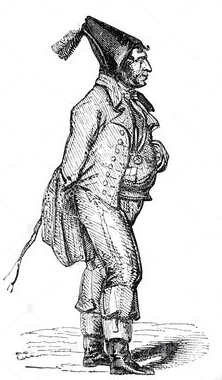 'Jemmy' Gordon
'Jemmy' GordonBarnwell Workhouse
History of the Barnwell Workhouse
This workhouse in Barnwell is assumed to be the same as St Edward’s workhouse Barnwell referred to in the article about Jemmy Gordon below.
The website workhouses.org.uk contains the following about the workhouse in Barnwell:
During the eighteenth century, the poor of Holy Sepulchre benefited from a bequest made in 1710 by Mr James Lowry. Part of the income from this charity was used for renting five cottages at the back of the Round Church to act as a workhouse. In 1813, the parish gave up these tenements and two years later paid £60 for part of the Geldart estate in Barnwell on which a workhouse was erected. The site had a forty-foot frontage on Staffordshire Place (now Staffordshire Street) running back 276 feet to Albert Street (now Young Street). In 1816, the parish of St Mary the Less paid Holy Sepulchre for a share in the premises.
In 1836, after the creation of the Cambridge and Chesterton poor law unions, the workhouse was used for a few years to house around a dozen sick and infirm paupers.
This was the final destination for the Cambridge eccentric, James ‘Jemmy’ Gordon. Son of the chapel clerk of Trinity College, he was articled to an attorney. However excessive drinking made this career impossible. The Cambridge Chronicle and Journal 23/9/1825 contained this obituary:
James, better known as ‘Jemmy’, an eccentric character, was the son of the chapel clerk of Trinity College, Cambridge, a man of some property, who gave him a good education, and articled him to an attorney. He began practice in Free School Lane, Cambridge, with fair prospects of success. Unfortunately his convivial talents led him into society where he learnt to drink to excess. To console himself for his disappointments, he became a confirmed sot, and fell into destitution. He was several times in the town gaol for drunken freaks. For many years he was kept from starvation by an annuity of a guinea a week left by a relative. He was induced to leave Cambridge for London, where he picked up a living by waiting at the coach offices. He returned, and used to pass the night in the grove at Jesus College and the barn at the Hoop hotel. A fall in a fit of drunkenness injured him so severely that he had to be taken to St Edwards’s workhouse at Barnwell, where he died on 16 Sept. 1825, when about sixty-three years old. He was a man of keen and ready wit, and several of his jests are preserved in Hone’s ‘Everyday Book,’ where there is a portrait of him . It is stated there that he had left a memoir of his life, which has not been published. Gunning gives some anecdotes of his thrusting his company during a university election upon Pitt in the senate house, and of his making money by writing Latin essays when in gaol. He was buried on 21st September 1825.
On Friday last, aged 63, the eccentric and well known James Gordon, of this town. In early life this extraordinary character had a fair prospect of excelling in his profession of an attorney; he was an excellent scholar, and possessed considerable attainments; a strong and ardent mind procured him the esteem of many friends, while his convivial talents, his wit and eloquence rendered him the delight of the social board. when severe disappointment crossed his path, and destroyed the hopes of his youth, the bottle unfortunately became his fatal resource. Then how rapid was his fall to the lowest state of misery and desolation. Although the inmate of a workhouse for the last few months, he owed not his sustenance to parochial relief; a small annuity bequeathed him by a relation having saved him from that degradation.
(Cambridge Chronicle and Journal – Friday 23 September 1825)
WILL OF JEMMY GORDON
Town Gaol August 31 1824
I, James Gordon, being of sound and disposing mind , do hereby give and bequeath to Alexander Scott Abbott Esq , Mayor of Cambridge, my body after my decease, for dissection or such other purposes as he shall think proper,upon condition that he gives me a coat, or suit of clothes, which he has done with, hoping that the cast off carcass will indemnify him for his cast off clothes – James Gordon
Contribute
Do you have any information about the people or places in this article? If so, then please let us know using the Contact page or by emailing capturingcambridge@
License
This work is licensed under CC BY-NC-SA 4.0





